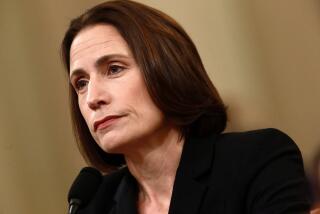U.S. Fears New Turmoil in Unraveling Nation : Upheaval: Possible ethnic conflicts and uncertainty over control of nuclear arms worry the White House.
- Share via
KENNEBUNKPORT, Me. — The very speed of the dramatic upheaval in the Soviet Union has raised deep fears in the White House that such a rapid unraveling could lead to further turmoil.
“The gut feeling is that the whole thing is going to fall apart,” said one Administration official of what he said are mounting concerns among senior advisers to President Bush that the Soviet Union stands at the brink of dangerous disintegration.
With the Communist Party so abruptly dislodged, another senior official warned publicly, the leaders of the Soviet Union must somehow find a way to govern a sprawling and divided nation without the institution that for seven decades has been the key to central control.
“All of the fingers out to the little villages and so forth are gone,” National Security Adviser Brent Scowcroft told reporters Sunday. He warned that such a void could result in “further instabilities” before the realignment results in something that “the (Soviet) society finds compatible with its dreams.”
The tempered view of what the Administration regards as the most dramatic change in the Soviet Union since the Russian Revolution came on a day when senior officials acknowledged that the shake-up has left the United States uncertain who controls Soviet nuclear weapons.
Asked whether the Administration believes that Soviet President Mikhail S. Gorbachev or rising power Boris N. Yeltsin is in control of the Soviet arsenal, Scowcroft described the question as “sensitive” on CBS’ “Face the Nation” and conceded: “I’m not sure we know in that kind of detail.”
Indeed, the national security adviser later described as “cloudy” the question of who holds command and control authority over the Soviet military.
The new uneasiness over what has been celebrated as a triumph of democracy reflects a growing consensus at the highest levels of the Administration that the dizzying changes of the last four days may prove to be unstoppable.
“No one is fooled by this thing,” one source said Sunday night, warning that the Soviet Union now lies close to fracture and then internal turmoil. “The glue is gone. There is no central authority any-more.”
Officials said there remains some debate among the President’s advisers over how close to a permanent unraveling the Soviet Union may be. They said there also remains disagreement about whether a breakdown of the union into separate republics inevitably would lead to conflict within those entities.
But they said that the concerns were heightened Sunday by the new declaration of independence by the Soviet republic of Byelorussia. And they made clear that warnings from pessimistic and influential aides have caused the White House to view with deep apprehension the meeting today in Moscow at which the Supreme Soviet is to take up the question of independence for the Baltic states.
In keeping with longstanding U.S. policy, President Bush has urged the Soviets to “set (the Baltics) free.” But his advisers are understood to have argued that such a decision, taken at a time when the Ukraine and other republics are similarly straining toward independence, would open the door to wholesale disintegration.
“If they vote that, it’s all over,” one Administration official warned.
The reason for concern about a fractured Soviet Union lies in the belief that, once broken into smaller parts, it would be riven by ethnic and religious conflict that would split even those republics apart.
Because the Russian Federation and the Ukraine have already declared that independence grants them control over all Soviet military forces within their borders, the prospect of a fractured Soviet Union raises the confusing and dangerous specter of a Red Army divided against itself.
In a television interview Sunday, Defense Secretary Dick Cheney described as “evolutionary” the question of “who is going to control the Soviet armed forces in the future.”
“The events have moved so fast that I am reluctant to jump to conclusions,” Cheney conceded on NBC’s “Meet the Press.” He suggested that the development by each republic of its own conventional military forces would pose little immediate threat to the United States.
But he cautioned that it is not yet clear what would happen to the control of Soviet strategic and tactical nuclear weapons as power is transferred from the center to the various republics. “We will have to await developments,” the defense secretary said.
In a separate interview on CBS, Scowcroft acknowledged that the Russian Federation’s claim of military authority leaves uncertain who controls long-range Soviet nuclear missiles, the bulk of which lie within the Russian borders. But he emphasized that every indication so far suggests that the control of those weapons has “remained in hands that did not increase the danger to the United States.”
The new expression of concern about the potential dangers in the upheaval in Moscow came as senior Administration officials who had remained cautious in their assessments emerged Sunday to characterize the events as indicative of a new Russian Revolution.
“I would say personally that these are the most dramatic developments at least since 1917,” said Scowcroft, thus putting the steps taken in the last four days on a par with the Communist takeover led by V. I. Lenin.
But the national security adviser, reflecting the fears within the White House, cautioned that “the situation is moving very rapidly . . . in all directions.”
“This is a society in the midst of a fundamental upheaval,” he said. And in a warning about the prospect of a conservative backlash, he said that it would be “excessive” to say that the right-wing power in the Soviet Union has been destroyed.
More to Read
Get the L.A. Times Politics newsletter
Deeply reported insights into legislation, politics and policy from Sacramento, Washington and beyond. In your inbox twice per week.
You may occasionally receive promotional content from the Los Angeles Times.










